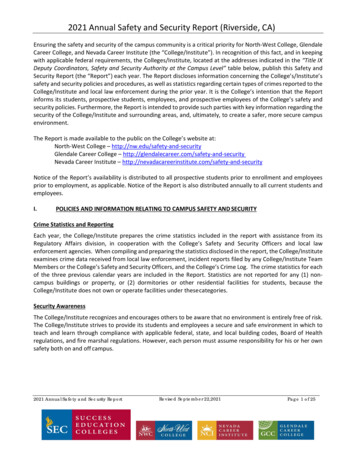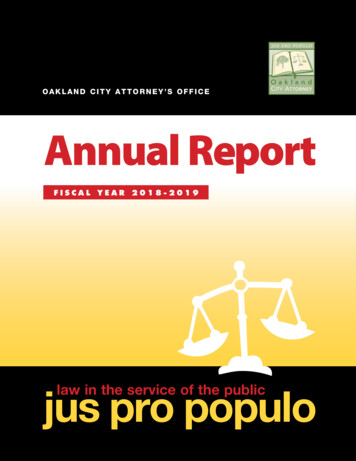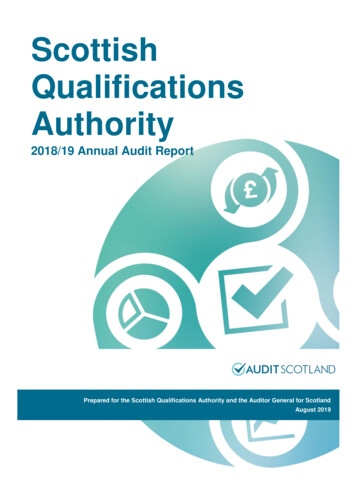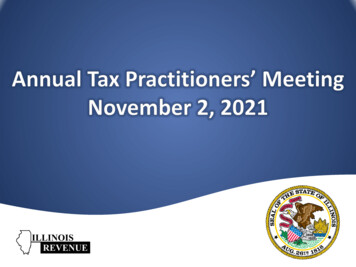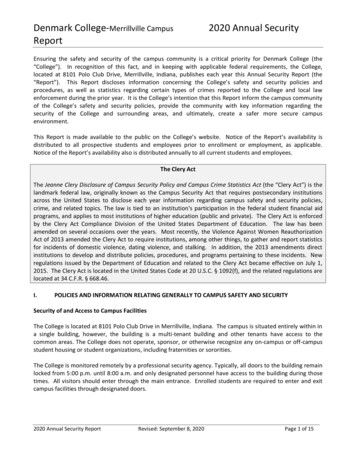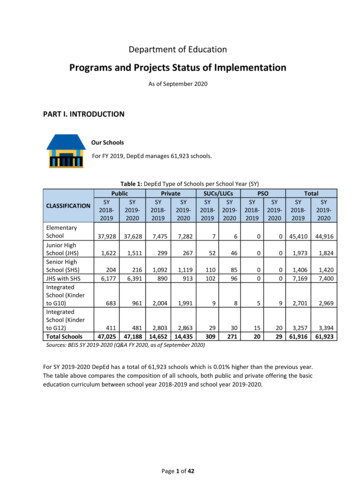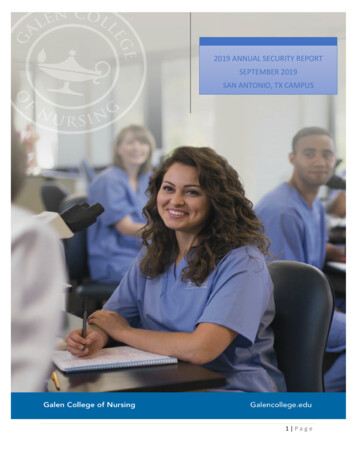
Transcription
2019 ANNUAL SECURITY REPORTSEPTEMBER 2019SAN ANTONIO, TX CAMPUS1 Page
Galen College of Nursing - San Antonio2019 ANNUAL SECURITY REPORTIntroductionThis report is provided in compliance with the Jeanne Clery Disclosure of Campus Security Policy andCrime Statistics Act, as amended. It provides students and employees of Galen College of Nursing - SanAntonio (“College”) with information on: the College’s security arrangements, policies and procedures;programs that provide education on such things as drug and alcohol abuse, awareness of various kindsof sex offenses, and the prevention of crime generally; and procedures the College will take to notify thecampus community in the event of an emergency. Its purpose is to provide students and employeeswith information that will help them make informed decisions relating to their own safety and the safetyof others.Policy for Preparing the Annual ReportThis report is prepared by the Office of Regulatory Affairs and Compliance in cooperation with local lawenforcement authorities and includes information provided by them as well as by the College’s campussecurity authorities and various other elements of the College. Each year an e-mail notification is madeto all enrolled students and employees that provides the website link to access this report. Prospectivestudents and employees are also notified of the report's availability. Hard copies of the report may alsobe obtained at no cost by contacting the Office of Regulatory Affairs and Compliance atcompliance@galencollege.edu.The College is committed to taking the actions necessary to provide a safe and secure working/learningenvironment for all students and staff. As a member of the campus community, you can feel safe andcomfortable knowing that security procedures are in place that represent best practices in the field, andare constantly tested and re-evaluated for their effectiveness.General Safety and Security PoliciesCampus Security Personnel & Relationship with Local Law EnforcementThe College does not have a campus security or police department.While the College does not have any written agreements with local law enforcement agencies, it doesmaintain a close working relationship with local police.Campus Security AuthoritiesThe College has designated certain officials to serve as campus security authorities. Reports of criminalactivity can be made to these officials. They in turn will ensure that the crimes are reported forcollection as part of the College’s annual report of crime statistics. The campus security authorities towhom the College would prefer that crimes be reported are listed below.2 Page
Matthew Sheehan, Associate Director of Campus Operations at msheehan@galencollege.edu;210-485-2277 (office) Patrick Nehls, Regional Director of Campus Operations at pnehls@galencollege.edu; 727-2586816 (office) The Office of Regulatory Affairs and Compliance at compliance@galencollege.edu.Reporting a Crime or EmergencyThe College encourages accurate and prompt reporting of all criminal actions, emergencies, or otherincidents occurring on campus, on other property owned by the College, or on nearby public property tothe appropriate administrator and appropriate police agencies. Such a report is encouraged even whenthe victim of a crime elects not to make a report or is unable to do so. If a crime is in progress or there is some other situation posing imminent danger, local lawenforcement can be reached by dialing 911. All criminal actions detected during school operating hours are to be reported to the front deskwho in turn will notify the school administrator on site. Galen supports the enforcement of alllocal, state, and national laws and will cooperate with appropriate law enforcement agencies inthis activity. Students, staff, and visitors may also report situations to one of the campus security authoritiesidentified above. Once reported, the individual may also be encouraged to report the situationto the appropriate police agency. If requested, a College staff member will assist in making thereport to police. Victims or witnesses are encouraged to report crimes to Campus administration, and maycontact the Office of Regulatory Affairs and Compliance at compliance@galencollege.edu toreport crimes and instances where the individual wants to remain anonymous or reportconfidentially, within the parameters of the law.Confidential ReportingThe College will protect the confidentiality of victims. Only those with a need to know the identity forpurposes of investigating the crime, assisting the victim or disciplining the perpetrator will know thevictim’s identity.There are certain employees at the College who are required to report to the Title IX Coordinator whenthey become aware of alleged sexual misconduct (including, but not limited to, dating violence,domestic violence, sexual assault, and stalking), including providing the status of the parties ifknown. Other personnel may be allowed to keep such information private, and the School Counselormay not report this type of information, thus allowing the victim to keep the report confidential. Avictim of other types of crimes (e.g., aggravated assault, burglary, etc.) who does not want to pursueaction within the College disciplinary system or the criminal justice system is nevertheless encouraged tomake a confidential report to a campus security authority or the School Counselor. Upon the victim’srequest, a report of the details of the incident can be filed with the College without revealing thevictim’s identity. Such a confidential report complies with the victim’s wishes, but still helps the Collegetake appropriate steps to ensure the future safety of the victim and others. With such information, theCollege can keep an accurate record of the number of incidents involving members of the campuscommunity, determine where a pattern of crime may be developing and alert the community as to any3 Page
potential danger. These confidential reports are counted and disclosed in the annual crime statistics forthe College.The College encourages its professional counselors, if and when they deem it appropriate, to inform theperson they are counseling to report crimes on a voluntary, confidential basis for inclusion in the annualreport of crime statistics. The College does not have pastoral counselors.Security of and Access to Campus FacilitiesGalen is committed to the safety of all students, faculty, and staff. Student, faculty, and staff arerequired to wear a photo identification badge when on campus or at a clinical site. These badges areprovided when students begin their program of study and to employees on the first day of employment.Entry doors to all campus facilities are locked and require either a security access code or swipe card toenter the premises. The codes are changes on a regular basis and swipe cards deactivated for inactivestudents and employees to ensure proper security access privileges. In addition, Galen may employsecurity to verify ID badges and disseminate visitor badges.Security Considerations in the Maintenance of FacilitiesEach campus facility is leased and the College relies on the building landlord and management to makethe appropriate repairs to keep the facility safe and in good working order. The Galen FacilitiesDepartment works to identify maintenance issues on campus that may be safety hazards. Safety checksare completed to identify street or safety lights that are not functioning properly, or to determine ifshrubs or other landscaping might need trimming. Appropriate building management is notified foraction. Maintenance personnel regularly check to ensure there is adequate lighting on pathways andthat egress lighting is working in hallways and stairwells.Educational Programs Related to Security Awareness and Prevention of Criminal ActivityThe College seeks to enhance the security of its campus and the members of the campus community byperiodically presenting educational programs to inform students and employees about campus securityprocedures and practices, to encourage students and employees to be responsible for their own securityand the security of others and to inform them about the prevention of crimes. These programs arediscussed below.The College provides information at the beginning of each academic term for students and employeesregarding the College’s security procedures and practices. This information can be found in the StudentCatalog, Employee Handbook, and on digital display around campus. Among other things, it advisesstudents and employees of the importance of reporting criminal activity, to whom crimes should bereported, being responsible for their own safety and the safety of others and practices regarding timelywarnings and emergency notifications.Crime prevention programs are also presented annually by the Office of Regulatory Affairs andCompliance and the campus’s Title IX Coordinator during National Prevention Week.Monitoring Off Campus Locations of Recognized Student OrganizationsThe College does not have any officially recognized student organizations with off campus locations andtherefore does not monitor or record criminal conduct occurring at such locations.Disclosure of the Outcome of a Crime of Violence or Non-Forcible Sex Offense4 Page
Upon written request, the College will disclose to the alleged victim of a crime of violence (as that termis defined in section 16 of title 18, United States Code), or a non-forcible sex offense, the report on theresults of any disciplinary proceeding conducted by the College against a student who is the allegedperpetrator of such crime or offense. If the alleged victim is deceased as a result of such crime oroffense, the next of kin of such victim shall be treated as the alleged victim for purposes of theparagraph.The previous paragraph does not apply to victims of dating violence, domestic violence, sexual assault,or stalking because under the Violence Against Women Act both the accused and accuser in these casesare given the results without the need to make a written request.Drug and Alcohol PolicyThe College is committed to creating and maintaining an environment that is free of alcohol abuse. TheCollege prohibits the possession, use, and sale of alcohol beverage on campus or as any part of theCollege's activities, unless it is done so in accordance with applicable College policies, and it alsoenforces the state's underage drinking laws.The College also enforces federal and state drug laws. The possession, sale, manufacture or distributionof illegal drugs is prohibited on campus or as any part of the College’s activities. Violators of theCollege's policies or federal and state laws regarding illegal drugs will be subject to disciplinary actionand possibly criminal prosecution.Drug and Alcohol Abuse Prevention ProgramIn compliance with the Drug Free Schools and Communities Act (DFSCA), the College has a drug andalcohol abuse and prevention program, which includes an annual notification to students andemployees regarding certain drug/alcohol-related information (such as legal sanctions for violations ofapplicable laws, health risks, etc.) and a biennial review of this program to evaluate its effectiveness andassess whether sanctions are being consistently enforced. For more information, see below. Galen's drug/alcohol policies applicable to students can be found on the Consumer Disclosurespage of our website under the "Drug Law Violations" and "Federal and State Drug TraffickingPenalties" headings: https://galencollege.edu/consumer-disclosures. The Drug Free Policy is published in the "Health & Safety" section of the StudentCatalog: /San Antonio Catalog JUL 19.pdf. The College also has a Drug-free Workplace Policy available on its internal Employee ResourceCenter. For more information about the biennial review of the College’s drug and alcohol abuseprevention program, please contact the Office of Regulatory Affairs and Compliance atcompliance@galencollege.edu.Policies, Procedures, and Programs Related to Dating Violence, DomesticViolence, Sexual Assault, and StalkingConsistent with applicable laws, the College prohibits dating violence, domestic violence, sexual assault,and stalking. The College’s policy used to address complaints of this nature, as well as the proceduresfor filing, investigating and resolving complaints, may be found at:5 Page
Equal Opportunity, Discrimination, and Harassment Policy:https://galencollege.edu/accommodations Resolution of Grievances Policy and Procedure - Disabilities, Discrimination, Harassment, andRetaliation: https://galencollege.edu/accommodationsThe following sections of this report discuss the College’s educational programs to promote theawareness of dating violence, domestic violence, sexual assault and stalking; provides informationconcerning procedures students and employees should follow and the services available in the eventthey do become a victim of one of these offenses; and advises students and employees of thedisciplinary procedures that will be followed after an allegation that one of these offenses has occurred.Primary Prevention and Awareness Program:The College conducts a Primary Prevention and Awareness Program (PPAP) for all incoming students andnew employees. The PPAP advises campus community members that the College prohibits the offensesof dating violence, domestic violence, sexual assault and stalking. They are also informed of the topicsdiscussed below, including relevant definitions, risk reduction, and bystander intervention.Crime DefinitionsCrime Type(Texas CodeAnnotated)DefinitionsThe institution had determined, based on good-faith research, that the criminal statutesof Texas do not define the term dating violence.However, Section 71.0021 of the Texas Family Code provides the following:Dating Violencea. "Dating violence" means an act, other than a defensive measure to protectoneself, by an actor that: (1) is committed against a victim or applicant for aprotective order: (A) with whom the actor has or has had a dating relationship; or(B) because of the victim's or applicant's marriage to or dating relationship withan individual with whom the actor is or has been in a dating relationship ormarriage; and (2) is intended to result in physical harm, bodily injury, assault, orsexual assault or that is a threat that reasonably places the victim or applicant infear of imminent physical harm, bodily injury, assault, or sexual assault.b. For purposes of this title, "dating relationship" means a relationship betweenindividuals who have or have had a continuing relationship of a romantic orintimate nature. The existence of such a relationship shall be determined basedon consideration of: (1) the length of the relationship; (2) the nature of therelationship; and (3) the frequency and type of interaction between the personsinvolved in the relationship.c. A casual acquaintanceship or ordinary fraternization in a business or socialcontext does not constitute a "dating relationship" under Subsection (b).In addition, Sections 51.251 and 51.281 of the Texas Education Code provide that “datingviolence” shall have the meaning assigned by the Jeanne Clery Disclosure of CampusSecurity Policy and Campus Crime Statistics Act (20.U.S.C. Section 1092(f)(6)(A)). This law6 Page
Crime Type(Texas CodeAnnotated)Definitionsdefines dating violence to mean violence committed by a person (A) who is or has been ina social relationship of a romantic or intimate nature with the victim; and where theexistence of such a relationship shall be determined based on a consideration of thefollowing factors: (i) the length of the relationship; (ii) the type of relationship; and (iii)the frequency of interaction between the persons involved in the relationship.The institution has determined, based on good-faith research, that Texas law does notdefine the term domestic violence.Domestic ViolenceHowever, Texas law does define the term “Family Violence” (Tex. Fam. Code Ann. §71.004) as follows: (1) an act by a member of a family or household against anothermember of the family or household that is intended to result in physical harm, bodilyinjury, assault, or sexual assault or that is a threat that reasonably places the member infear of imminent physical harm, bodily injury, assault, or sexual assault, but does notinclude defensive measures to protect oneself; (2) abuse [as defined under state law] bya member of a family or household toward a child of the family or household; or (3)dating violence, as that term is defined by Section 71.0021.Section 42.072 of the Texas Penal Code provides the following definition of stalking:Stalking A person commits an offense if the person, on more than one occasion andpursuant to the same scheme or course of conduct that is directed specifically atanother person, knowingly engages in conduct that: (1) constitutes an offenseunder Section 42.07, or that the actor knows or reasonably should know theother person will regard as threatening: (A) bodily injury or death for the otherperson; (B) bodily injury or death for a member of the other person's family orhousehold or for an individual with whom the other person has a datingrelationship; or (C) that an offense will be committed against the other person'sproperty; (2) causes the other person, a member of the other person's family orhousehold, or an individual with whom the other person has a dating relationshipto be placed in fear of bodily injury or death or in fear that an offense will becommitted against the other person's property, or to feel harassed, annoyed,alarmed, abused, tormented, embarrassed, or offended; and (3) would cause areasonable person to: (A) fear bodily injury or death for himself or herself; (B)fear bodily injury or death for a member of the person's family or household orfor an individual with whom the person has a dating relationship; (C) fear that anoffense will be committed against the person's property; or (D) feel harassed,annoyed, alarmed, abused, tormented, embarrassed, or offended.In addition, Sections 51.251 and 51.281 of the Texas Education Code provide that“stalking” shall have the meaning assigned by the Jeanne Clery Disclosure of CampusSecurity Policy and Campus Crime Statistics Act (20.U.S.C. Section 1092(f)(6)(A)). This lawdefines stalking as engaging in a course of conduct directed at a specific person that7 Page
Crime Type(Texas CodeAnnotated)Definitionswould cause a reasonable person to (A) fear for his or her safety or the safety of others;or (B) suffer substantial emotional distress.The Texas Penal Code provides the following definitions for sexual assault and aggravatedsexual assault: Sexual Assault (Tex. Penal Code Ann. § 22.011): A person commits an offense: If the person intentionally or knowingly: (A) causes the penetration of theanus or sexual organ of another person by any means, without thatperson's consent; (B) causes the penetration of the mouth of anotherperson by the sexual organ of the actor, without that person'sconsent; or (C) causes the sexual organ of another person, without thatperson's consent, to contact or penetrate the mouth, anus, or sexualorgan of another person, including the actor; orSexual Assault Regardless of whether the person knows the age of the child at the timeof the offense, the person intentionally or knowingly: (A) causes thepenetration of the anus or sexual organ of a child by any means; (B)causes the penetration of the mouth of a child by the sexual organ of theactor; (C) causes the sexual organ of a child to contact or penetrate themouth, anus, or sexual organ of another person, including the actor; (D)causes the anus of a child to contact the mouth, anus, or sexual organ ofanother person, including the actor; or (D) causes the mouth of a child tocontact the anus or sexual organ of another person, including the actor. Aggravated sexual assault (Tex. Penal Code Ann. § 22.021): A person commits anoffense: If the person: (A) intentionally or knowingly: (i) causes the penetration ofthe anus or sexual organ of another person by any means, without thatperson's consent; (ii) causes the penetration of the mouth of anotherperson by the sexual organ of the actor, without that person's consent;or (iii) causes the sexual organ of another person, without that person'sconsent, to contact or penetrate the mouth, anus, or sexual organ ofanother person, including the actor; or (B) regardless of whether theperson knows the age of the child at the time of the offense, intentionallyor knowingly: (i) causes the penetration of the anus or sexual organ of achild by any means; (ii) causes the penetration of the mouth of a child bythe sexual organ of the actor; (iii) causes the sexual organ of a child tocontact or penetrate the mouth, anus, or sexual organ of another person,including the actor; (iv) causes the anus of a child to contact the mouth,anus, or sexual organ of another person, including the actor; or (v) causesthe mouth of a child to contact the anus or sexual organ of anotherperson, including the actor; and8 Page
Crime Type(Texas CodeAnnotated)Definitions If: (A) the person: (i) causes serious bodily injury or attempts to cause thedeath of the victim or another person in the course of the same criminalepisode; (ii) by acts or words places the victim in fear that any person willbecome the victim of an offense under Section 20A.02(a)(3), (4), (7), or(8) or that death, serious bodily injury, or kidnapping will be imminentlyinflicted on any person; (iii) by acts or words occurring in the presence ofthe victim threatens to cause any person to become the victim of anoffense under Section 20A.02(a)(3), (4), (7), or (8) or to cause the death,serious bodily injury, or kidnapping of any person; (iv) uses or exhibits adeadly weapon in the course of the same criminal episode; (v) acts inconcert with another who engages in conduct described by Subdivision(1) directed toward the same victim and occurring during the course ofthe same criminal episode; or (vi) administers or provides flunitrazepam,otherwise known as rohypnol, gamma hydroxybutyrate, or ketamine tothe victim of the offense with the intent of facilitating the commission ofthe offense; (B) the victim is younger than 14 years of age; or (C) thevictim is an elderly individual or a disabled individual.In addition, Sections 51.251 and 51.281 of the Texas Education Code provide that “sexualassault” shall have the meaning assigned by the Jeanne Clery Disclosure of CampusSecurity Policy and Campus Crime Statistics Act (20.U.S.C. Section 1092(f)(6)(A)). This lawdefines sexual assault as any nonconsensual sexual act proscribed by Federal, tribal, orState law, including when the victim lacks capacity to consent.For purposes of the Clery Act, the term “sexual assault” includes the offenses of rape,Rape, Fondling, Incest,fondling, incest, and statutory rape. The institution has determined, based on good-faithStatutory Raperesearch, that Texas law does not define these terms.Other crimes under Texas law that may be classified as a “sexual assault” include thefollowing:Other “sexual assault”crimes Prohibited Sexual Conduct (Tex. Penal Code Ann. § 25.02): A person commits anoffense if the person engages in sexual intercourse or deviate sexual intercoursewith another person the actor knows to be, without regard to legitimacy: (1) theactor's ancestor or descendant by blood or adoption; (2) the actor's current orformer stepchild or stepparent; (3) the actor's parent's brother or sister of thewhole or half blood; (4) the actor's brother or sister of the whole or half blood orby adoption; (5) the children of the actor's brother or sister of the whole or halfblood or by adoption; or (6) the son or daughter of the actor's aunt or uncle ofthe whole or half blood or by adoption. Indecency With a Child (Tex. Penal Code Ann. § 21.11): A person commits anoffense if, with a child younger than 17 years of age, whether the child is of thesame or opposite sex and regardless of whether the person knows the age of the9 Page
Crime TypeDefinitions(Texas CodeAnnotated)child at the time of the offense, the person (1) engages in sexual contact with thechild or causes the child to engage in sexual contact; or (2) with the intent toarouse or gratify the sexual desire of any person: (A) exposes the person’s anusor any part of the person’s genitals, knowing the child is present; or (B) causesthe child to expose the child’s anus or any part of the child’s genitals.A sexual assault is without the consent of the other person if: (1) the actor compels theother person to submit or participate by the use of physical force, violence, or coercion;(2) the actor compels the other person to submit or participate by threatening to useforce or violence against the other person or to cause harm to the other person, and theother person believes that the actor has the present ability to execute the threat; (3) theother person has not consented and the actor knows the other person is unconscious orphysically unable to resist; (4) the actor knows that as a result of mental disease or defectthe other person is at the time of the sexual assault incapable either of appraising thenature of the act or of resisting it; (5) the other person has not consented and the actorConsent (as it relates knows the other person is unaware that the sexual assault is occurring; (6) the actor hasintentionally impaired the other person's power to appraise or control the other person'sto sexual activity)conduct by administering any substance without the other person's knowledge; (7) the(Tex. Penal Code Ann. actor compels the other person to submit or participate by threatening to use force or§ 22.011)violence against any person, and the other person believes that the actor has the abilityto execute the threat; (8) the actor is a public servant who coerces the other person tosubmit or participate; (9) the actor is a mental health services provider or a health careservices provider who causes the other person, who is a patient or former patient of theactor, to submit or participate by exploiting the other person's emotional dependency onthe actor; (10) the actor is a clergyman who causes the other person to submit orparticipate by exploiting the other person's emotional dependency on the clergyman inthe clergyman's professional character as spiritual adviser; or (11) the actor is anemployee of a facility where the other person is a resident, unless the employee andresident are formally or informally married to each other under Chapter 2, Family Code.College Definition of ConsentThe College does not have its own definition of consent as it relates to sexual misconduct.Risk ReductionIf you find yourself in an uncomfortable sexual situation, these suggestions may help you reduce yourrisk: Make your limits known before going too far. You can withdraw consent to sexual activity at any time. Do not be afraid to tell a sexualaggressor “NO” clearly and loudly. Try to remove yourself from the physical presence of a sexual aggressor. Be direct as possibleabout wanting to leave the environment.10 P a g e
Grab someone nearby and ask them for help. Be responsible about your alcohol and/or drug use. Alcohol and drugs can lower your sexualinhibitions and may make you vulnerable to someone who views an intoxicated/high person as asexual opportunity. Attend large parties with friends you trust. Watch out for your friends and ask that they watchout for you. Be aware of someone trying to slip you an incapacitating “rape drug” like Rohypnol or GHB.If you find yourself in the position of being the initiator of sexual behavior, these suggestions may helpyou to reduce your risk of being accused of sexual assault or another sexual crime: Remember that you owe sexual respect to the other person. Don’t make assumptions about the other person’s consent or about how far they are willing togo. Remember that consent to one form of sexual activity does not necessarily imply consent toanother form of sexual behavior. If your partner expresses a withdrawal of consent, stop immediately. Clearly communicate your sexual intentions so that the other person has a chance to clearly tellyou their intentions. Consider “mixed messages” a clear sign that the other person is uncomfortable with thesituation and may not be ready to progress sexually. Don’t take advantage of someone who is really drunk or on drugs, even if they knowingly andintentionally put themselves in that state. Further, don’t be afraid to step in if you see someoneelse trying to take advantage of a nearly incapacitated person. Be aware of the signs of incapacitation, such as slurred speech, bloodshot eyes, vomiting,unusual behavior, passing out, staggering, etc.It is also important to be aware of the warning signs of an abusive person. Some examples include: pastabuse; threats of violence or abuse; breaking objects; using force during an argument; jealousy;controlling behavior; quick involvement; unrealistic expectations; isolation; blames others for problems;hypersensitivity; cruelty to animals or children; “playful” use of force during sex; Jekyll-and-Hydepersonality.Bystander InterventionIn addition to reporting incidents to appropriate authorities, below are some ways in which individualscan take safe and positive steps to prevent harm and intervene when there is a risk of dating violence,domestic violence, sexual assault, or stalking against another person. Look out for those around you. Realize that it is important to intervene to help others. Treat everyone respectfully. Do not be hostile or an antagonist. Be confident when intervening. Recruit help from others if necessary.11 P a g e
Be honest and direct. Keep yourself safe. If things get out of hand, don’t hesitate to contact the police.Oth
SAN ANTONIO, TX CAMPUS . 2 Page . Galen College of Nursing - San Antonio. 2019 ANNUAL SECURITY REPORT. Introduction This report is provided in compliance with the Jeanne Clery Disclosure of Campus Security Policy and Crime Statistics Act, as amended. It provides students and employees of Galen College of Nursing -San
